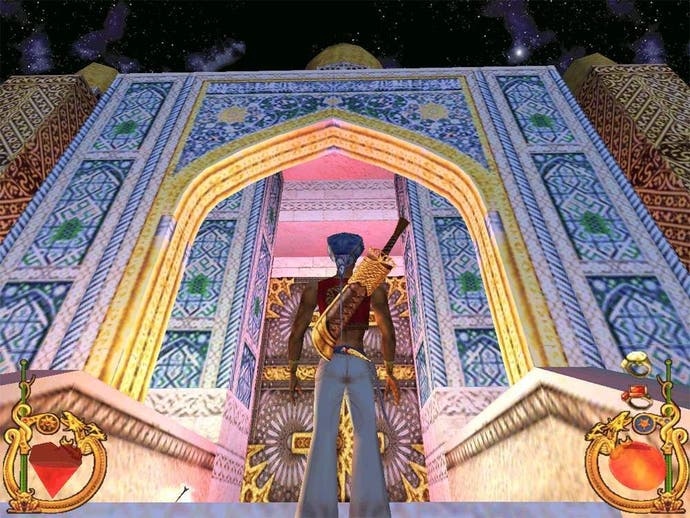Whatever Happened To .. Episodic Gaming
Article - the first in a (very) irregular series of articles taking a look at buzzwords which seemed like a nice idea at the time
Judging from your average press release, the gaming industry is all about the creation, copyrighting and hyping of buzzwords. Sometimes these ideas take off (massively multiplayer role-playing games, for example), sometimes they don't (like virtual reality) and sometimes you just wish they hadn't (hello cel shading). Over the coming months we'll be taking a look at some of these bright ideas and trying to work out what all the fuss was about. To kick things off, this week we examine episodic gaming.

What Is It?
The idea behind episodic gaming is simple enough; instead of selling one big game for £30 you split it up into several episodes and sell each one individually at the kind of price which encourages impulse buying. Often the first episode is given away for free to hook potential players, who are then roped into buying new levels for your game every few weeks. Yes, episodic gaming is essentially a fancy new name for shareware. These days though the idea seems to be that you plan out (and often develop) a whole series of mini-games in advance and then release them on a monthly basis. One of the pioneers in this field was Wing Commander : Secret Ops, which was first released in 1998. Based on the Wing Commander Prophecy engine and described as a "thank you" for fans of the series, it was distributed free over the internet. Unfortunately the first episode's rotund 120Mb download size tended to be a turn-off at a time when most of us were still using 56k modems. The whole series was later bundled together and sold via more conventional means on a CD-Rom. Since then everyone from Infogrames CEO Bruno Bonnell to Sony have claimed that episodic gaming is the future, although few people have been willing to put their money where their mouth is. The first few episodic games were mostly developed by tiny companies which nobody had ever heard of before or (in most cases) since. Many of these companies also followed Origin's lead by eventually releasing their game to retail once the series was complete. When big companies did get in on the act the result was usually disastrous - witness Electronic Arts and their over-ambitious big budget flop Majestic.

What Went Wrong?
The biggest problem with episodic gaming is its very nature. By selling a game an episode at a time you might make it cheaper for gamers to buy, but you also allow them to bail on the series at any time. As Arush CEO Jim Perkins told USA Today, "in the past, if players didn't enjoy a game they were simply out 50 bucks, but with episodic gaming they don't have to continue in a series they don't like and can save money". That might be good for gamers, but it's not good for companies like Arush. Just as ratings for television shows inevitably drop over the course of a season, so less and less people will tend to buy each new episode of your game. If it wasn't very good to start with sales will probably plummet after the first couple of episodes. The flipside to this is that episodic games can be developed in part as you go along, allowing you to get the game on sale quicker. If it turns out to be a flop you can pull the plug on further development and your losses are (hopefully) reduced. Of course, while this is great in theory it doesn't always work out in practice. Back when Arush (then known as WEB Corp) announced that they were working on an episodic Duke Nukem game, the Duke was quoted as saying "I can't wait to bust into episodic gaming. Before, I was restricted to kicking ass every once in a blue moon. Now that I'm working with WEB Corp., the sky's the limit - I'll be taking on new challenges all the time". Unfortunately eighteen months and one blue moon later there's still no sign of the game, and recent reports suggest that it will now be released the old fashioned way instead of online. 3D Realms co-founder Scott Miller's dream of "more gameplay, less cost, and an ongoing Duke series" seems to have evaporated in a puff of vapourware. Size is also an issue. While some companies have managed to successfully distribute small, entertaining games, others have failed to adequately optimise their products for the net resulting in bloated downloads like the first episode of Secret Ops. Broadband is taking off slowly in most countries, and this has continued to stifle developers' hopes of distributing entire games over the internet. When we all have multi-megabit DSL pipes directly into our houses this may come true, but for now many episodic games are lo-fi affairs with relatively primitive graphics and limited sound to keep the download sizes to a manageable level.

Where Now?
So is this the end for episodic gaming, for the moment at least? Well, not quite. One type of game which is uniquely placed to take advantage of episodic content is the massively multiplayer role-playing genre. People are used to paying $10 a month or more to play these games and already pioneers such as Asheron's Call have introduced the idea of giving a persistent world an on-going storyline released in monthly episodes. Single player games are also continuing to grab hold of the bandwagon as it speeds past. Undoubtedly the highest profile episodic game in the works at the moment is the new Tomb Raider, although it remains to be seen whether the PlayStation 2 hard drive and internet broadband adapter will have a sufficient installed base by the end of this year to make updating the game worthwhile. Assuming everything goes to plan though, Core will be releasing new Tomb Raider episodes for players to buy every few months. Which is pretty much what they've been doing for the last five years, come to think of it...

